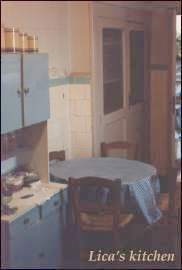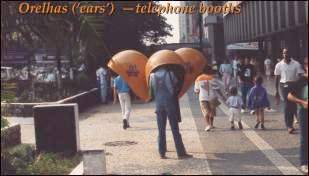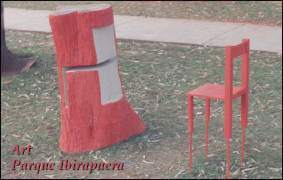



| | 
|

When we were eating with Sandra the other day, Lica pointed out a customer and said he looked American... and he said I look American too. Just once I'd like to be mistaken for a Frenchman. I looked at this chap and had to agree: clothes and general air marked him as different. In my case, I'm much too fair to be a Brazilian (tho' a great range of skin colors is available here). Also, the camera is a bit of a giveaway.
You don't make Polish jokes here, of course. You make Portuguese jokes. (Shades of Hawaii.) The Portuguese, as the ruling class, earned much resentment, understandably, but the stereotype is that they're stupid (even in discovering the country-- they were looking for India). Since many people are of Portuguese descent, this seems to imply a certain doublethink, or at least a long-established sense of identity as Brazilians rather than Portuguese .
[ Dictionaries give many interesting translations for couve, including cabbage, kale, and 'colewort'. I later confirmed that it's kale. ]
Over the beans and rice you put various kinds of pork: loins, liver, knees, ribs, ears, you name it. At the buffet you have a choice, in case you don't like pork eyes, or whatever, but Lica says a "real" feijoada has everything mixed together. It's good-- very different from anything I've had. It's rather salty. You drink it with a batida, sugar-cane liqueur-- very sweet and strong.
The big expedition this afternoon was to cash travelers' cheques. Lica could change dollars, but not checks, at the parallel rate, about Cz$ 1000 to the dollar; the official rate is Cz$ 600. I ended up going to the Hilton, which sent me to a travelers' bureau called Casa Faro, which however only offered me Cz$ 700. I took it, being sick of the whole process by now, and received a wad of cruzados. I was worried the rest of the afternoon about this wad, imagining it sticking out of my pocket like something out of Aubrey Beardsley... I suppose the thieves said, "Não tocamos isto... parece louco."
[ 2002 note: I was used to using travelers' cheques from traveling in Europe; no one told me what a hassle they'd be in Latin America. Next trip, I brought cash, stored in a hidden pocket. ]
 I took a taxi to MASP, a Museu da Arte de São Paulo, a modern building with no 1st floor-- the 2nd and 3rd floors are on stilts, and there's two underground levels. Most interesting was a collection of Japanese glassware, which ranged from the beautiful to the bizarre. There was also an exhibit on German design, which did little, I'm afraid, to increase my knowledge of Brazilian culture.
I took a taxi to MASP, a Museu da Arte de São Paulo, a modern building with no 1st floor-- the 2nd and 3rd floors are on stilts, and there's two underground levels. Most interesting was a collection of Japanese glassware, which ranged from the beautiful to the bizarre. There was also an exhibit on German design, which did little, I'm afraid, to increase my knowledge of Brazilian culture.
A long, hot walk on tired feet back to Lica's. I have to revise my opinion of the city: I found some of the more attractive streets today, off Avenida Paulista, and toward the center of town-- e.g. Praça Republica.
A tourist map the Hilton gave me, by the way, has this to say about feijoada:
Most os the restaurants serves Feijoada at Wednesday and Saturday, the main course of the Brazilian Cuisine with a self service system.I took a nap waiting for Lica to get home. I should have gone into training for this trip-- weight-lifting, aerobic walking.
Lica came back about 8.30. He wasn't hungry-- évidemment he'd gone out for a few cold ones with the guys at work. So Shirley and I ordered out-- or rather she did and I helped eat it. It was a breaded filet of chicken, and they'd gone and breaded a banana and a slice of pineapple too, and thrown it in with arroz a grego and little, crisp fries. The conversation was again rather disjointed, but we got by. She asked me what directors best captured American life, and I mentioned Woody Allen and (ironically) Steven Spielberg. She says she pictures Italy as a Fellini film-- which is most true, I think, only of Rome.
Finally, near ten, we were off: Lica was taking me to a party (festa) which was organized by some folks at the Banco do Brasil. They had rented a restaurant and a band, and invited several hundred people for drinking and dancing. It turned out to be a '60s evening, in music 'tho not in clothing, and so after just a bit of Latin music, it was on to '60s pop-- the Beatles, the Rolling Stones, the Mamas and the Papas, Simon & Garfunkel, even the Monkees.
We sat with one of Lica's co-workers, Luís, and a girl he knew from another branch-- I forget her name-- call her Marilyn, after a girl I knew in high school. She and Lica danced, while I talked with Luís a bit-- partly in English, partly in this crazy mixture of Portuguese and Spanish he insisted on using, which however I understood very well.
Luís explained a game or joke that was going on on the dance floor. Some guy was dancing with a broom. After a suitable interval he would tap ont he shoulder of a guy dancing with a beautiful girl, take her away, and leave the guy to dance with the broom.
There were 2 exhibition dances by professional dancers, one couple being particularly impressive, and a drawing for a door prize. As each number was called, Luís (and others) called "Marmelada!-- which I daresay is a cute way of saying merda!
At a break a beautiful girl came by-- a friend of Marilyn's-- a Carioca. She was duly introduced to me (her name is Suzanna), and I was asked to introduce her to Luís-- she then said "How do you do?" to Luís, taking him for an American, which everybody thought was very funny. Suzanna gave me some tips on Rio, the most useful of which were tips on restaurants. Her first thought was "Watch out for thieves." Nice burg, Rio.
Luis and I each got a dance with Marilyn, but she and Lica danced pretty seriously for the rest of the evening. I think both Luís and I, watching the happy dancing couples, got a little sad. Luís left eventually, and I wouldn't have minded leaving either. Finally, about 3 a.m., we took off. We drove Marilyn home, and I had spent enough time with her that I rated a little goodbye kiss on the cheek-- Lica, naturalmente, got a more interesting one.

| | 
|

Anyway, I walked down Rua Cristiano Viana (where I did my laundry) till I came to an agência de viagens. I breezed right in and asked about fares to Belo Horizonte and thence to Rio. We were doing great, all in Portuguese, till we foundered on a question of travelers' cheques, and the woman had to call in an English-speaking manager. Oh, well. Airfare for the two flights would be Cz$ 8,000, or just over $60.
I had lunch at a little lanchonete-cum-restaurant, with an odd mixture of Coke signs, religious decorations, and Boris Vallejo erotic art on the walls. I had chicken, with rice, farofa, and feijão, plus suco de limão (lemon juice) and agua minerala, all for Cz$ 2000: that's $2 at the unofficial rate, and only $3.30 at the official. But I feel horribly First World making these comparisons.
I went back to Lica's to pick up my travelers' cheques, then back to the travel agency to buy the tickets. I still needed help from English speakers to get by, but we did get the tickets in order. I thanked the girl for her patience, and she smiled.
Linguistic curiosity: sometimes even words I can understand turn into sentences I couldn't. The girl went into the back for a moment, telling me, "Sómente cinco." Only five. But only 5 what? I was stumped, till someone supplied the meaning: "I'll just be a minute."
Well, my original intention was to speak as well as the phrasebook. This I can do, and if I can't understand everything that's said to me, well, that's the frustration of success, not failure.
[ 2002 note: I studied Portuguese for about a month before the trip. I worked through an audio course, and made a tape for myself with 2000 vocabulary words, to drill myself in the car. (And that vocabulary was only barely adequate, which is why I laugh at Basic English and other schemes to get by with minimal vocabulary.) I did have once chance to practice before I left-- I was introduced to a Peruvian girl who knew Portuguese. She thought I did pretty well for the little time I'd been studying. ]
Another note: last night Luís kept saying, as I thought, nós outros-- "us others." I thought it an odd tournure, but understood the sentences fine, and didn't think much about it. Today it came to me that he was saying, in his Spanish-Portuguese pidgin, nosotros-- 'we' simply, in Spanish.
Finally I went back to Lica's, called Lica and made dinner plans, and went out one last time to see São Paulo-- this time by taxi to the Parque Ibirapuera, where I wandered around taking pictures.
At one spot there's a cage with 2 kinds of parrots, and a pair of toucans. Toucans are amazing-looking creatures-- they look like they came out of a computer-animated film-- they seem constructed out of simple solids, and their brightly-colored, unreal beaks look airbrushed.
 The park is very pretty. It was not very crowded; the people there were joggers, lovers, skateboarders, idle walkers, and workers at the various museums, which were all closed when I was there. Nobody else with a camera-- this town just doesn't seem set up for tourism. It's happy just sitting here being Brazilian-- a far cry from London, where English can seem a minority tongue, and every store doubles as a bureau de change.
The park is very pretty. It was not very crowded; the people there were joggers, lovers, skateboarders, idle walkers, and workers at the various museums, which were all closed when I was there. Nobody else with a camera-- this town just doesn't seem set up for tourism. It's happy just sitting here being Brazilian-- a far cry from London, where English can seem a minority tongue, and every store doubles as a bureau de change.
The soil in São Paulo (and Piracicaba) is reddish-brown, quite bright in color. It's called terra roxa-- roxa actually means 'purple', but folks got used to the Italians calling it terra rossa ('red earth'), and adopted the phrase.
Another observation: there don't seem to be many dogs or cats in São Paulo. You certainly see them, but not as much as in the U.S. or Europe. And the streets are clean-- comparable to Chicago, or better, and without what our street-sign writers call 'dog nuisances.' (On the other hand, it's still wise to look where you're going, since the pavement tends to be uneven, or torn up for construction.)
Anyway, I took a taxi back to Lica's, and took a nap waiting for him. We went out for dinner, my treat, about 10. Lica chose a place in the hip-happenin' section of town, Bixiga, with theatre, a 'cine-café', and hot clubs (one is called Piú Piú [2002 note: which is the name of Tweety-bird in Brazil ]).
We went to an Italian restaurant called Cantina Montechiara, if I'm not mistaken. I had ravioli and chicken, while Lica had frango à cubana, which turns out to be the breaded chicken filets Shirley and I had the other day.
We talked about America, Brazil, and what Lica would do if he were president. A major problem here is the lack of strong institutions. Ours are strong enough to survive crises and bad men-- the Presidency can tolerate a Nixon, a Reagan-- but Brazil's aren't. There's too much corruption, too much selective enforcement of the law, too few statesmen whose integrity is uncompromised.
As an example, a major state bank in the Northeast failed, Lica says, because a few millionaires refused to pay back their loans. The government did not press them, and the bank failed. If it had pressed them, Lica thinks they would have claimed that "São Paulo is oppressing the Northeast again," as if the handful of rich men in the Northeast didn't deserve all the oppression they got.
Lica also warned me that the impression of relative prospertiy São Paulo gives off is illusory. 75% of Brazil can barely feed itself. But even if we allow that only 25% of the country is middle- to upper-class, that's 35 million out of a population of 140 million: three times the population of Portugal, half that of Italy. Even poor, Brazil is a significant market; no wonder the international companies, and the Japanese, are coming in, and stay, despite various alarums. And most of those better-off people live in São Paulo, or the richer Southern states, plus Minas Gerais and Rio. The Northeast is more like 90% poor, and has more the economics of Zaïre.
[ 2002 note: I've since been in the Northeast, and I think the above information is outdated at best. Natal, for instance, is nothing like Africa. ]
On the way back, along Rua Augusta, we saw the whores, some of whom, Lica said, were actually men. It's fitting that both the places Scott recommended to me are on this street.

| | 
|
